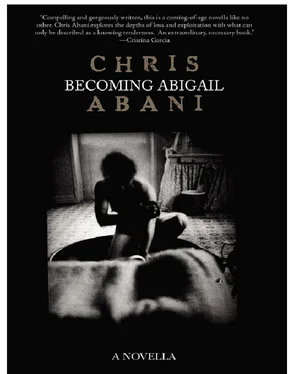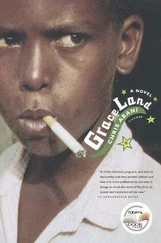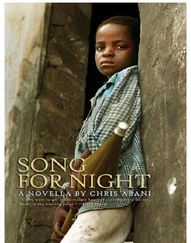Like what she had felt for her father. At least before he died. Before his daily ride on Abigail’s coffin became permanent. The rope he had hung himself from, cut, dropped him, not back into this world, but through the floor, and it seemed as though the hard of concrete yielded like the soft of loam. She hadn’t cried then, feeling instead his release. And now here he was again, in this stranger’s tender fumbling. She touched his face: Derek’s. Beneath them the lights of Greenwich flowed into the lights from the Queen’s house, running into the Thames. She shivered and he mistook the intent.
“Don’t be afraid,” he said.
She smiled in the dark and pulled him close. They stood there awhile. Then she unbuttoned his shirt and hers. Her breasts, her nipples hard, pressed into his softer chest. This feeling wasn’t the familiarity she had expected. Instead she felt passion enveloping her, and she gave into the safety, the warmth, looking up into his eyes, eyes blue as the sea she had never seen except on television, eyes looking at her, wanting no more than was here. This was love? To be seen. No turning away. No turning toward. Just there.
Later that night, in Derek’s home, while his wife slept in their floral wallpapered bedroom under the warmth of bedclothes, they made love on the sofa. And Abigail was giving. For the first time, she wasn’t taken. And she wept for her joy and for the loss of Derek’s wife upstairs dreaming the dreams of love amidst all that floral wallpaper, as though in an English country garden. Abigail, this Abigail, only this Abigail, always this Abigail, felt herself becoming, even in this moment of taking. Later, as Derek dozed on the sex-rank sofa, stained with their smeared secretions, she stole into the kitchen and finding the needle Derek’s wife used to sew all her love into the turkey at Christmas, she held it over the naked flame of the gas range. And in the cold reflection of the microwave’s window, she burned two points onto her breasts, one on each. Each one. One on one. Then one in the middle, the hard of her sternum pressing back against the needle. One on her stomach. On each thigh. Each knee. Several round each ankle until they were wearing a garland. Then in the blindness of faith, dots on the back of her thighs, running desperately up to the rise of her buttocks. Then one on her pudenda, dead center. Her fingers followed the needle’s point, popping each blister as it rose in heat, as it rose in its hot desire, like dough rising to the love of the flame, rising to the need of the bread, to the unspoken desire of a child in the blue light of predawn hugging the warmth of a loaf against the cold. And each bubble of hope wept salty water running cool and delicious in its sting. And in the tears running down her face she tasted herself for the first time. For the first time tasting the end.
And when she returned to the sofa, he was sitting up smoking, each flare in the dark punctuating his waiting. Sitting, she took the cigarette from him and smoked it. He ran his hands over her, stopping as his fingers encountered the bubbles of Braille. He bent and looked closer, looked at her. She caught his eye and pulled back into the shadows. She knew this look. This wasn’t the look in the park. This was the familiar look of men wanting her to be something they wanted.
“What is this?” and his voice carried all the fear of one losing himself in the salt of a woman.
She held his fingers against her. Against her dots.
“This one,” she said, touching the ones on each breast, first one, then the other. “This one is you, this, me. In the middle is Greenwich. Here,” and she was down on her stomach, “is my hunger, my need, mine, not my mother’s. And here, and here and here and here, here, here, here, me, me, me. Don’t you see?” and she showed him the words branded in her skin. How had he missed them when they made love? But he had. “This is my mother,” she was saying. “This is my mother. Words. And words. And words. But me? These dots. Me, Abigail.”
And he traced her in that moment, the map of her, the skin of her world, as she emerged in pointillism. Emerging in parts of a whole. Each. Every. He wondered what would form should he draw a line between each dot. Connecting. And what would he use for ink? Blood? Semen? He held her. Held her and cried. While upstairs his wife slept. Held her, this man-child who was her social worker.
His tears felt cool on the hot of her skin. And she smiled as his release cooled her. Like finely worked metal. And she smiled. In the dark.
Standing here, now, at The Needle, face turned to Greenwich as if seeing the memories play against the dark sky, she rubbed the amber pendant still around her neck furiously. There was nothing more that could be done. Now that she had been found she realized the deeper joy was to be lost. And the amber pendant burned a deeper dot, a deeper mark, invisible though it was. No, the deeper joy wasn’t being lost. But it wasn’t being found. It was being seen. And now that she could not feel that gaze on her, she was more lost than ever.
“Abigail,” she called softly to the dark. The cold. The water. “Abigail.”
And with the hum of traffic behind her, it was as though she hadn’t spoken.
As if the wind was merely passing through her.
She was in a bus on her way home from school. Early. Her cousin Peter was home from London and her father had sent for her. She already knew why. Something lying in the middle island of the freeway caught her eye, diverting her attention. It looked to her like the body of a baby, perhaps tossed from the window of a speeding car by a teenage mother unable to cope. It wasn’t an unusual thought in this country where the dead littered the streets of big towns and cities like so much garbage. But as they drew closer it was simply an untidy pile of rubber from a blown tire. Even though she knew it wasn’t the corpse of a baby, somehow the thought of death stayed with her. It should have been an omen, especially on this day, when she knew Peter and her father were talking about her going back to London with him.
Thinking of London and her cousin Peter reminded her of her father’s funny stories about his time there. He seldom told them because it invariably meant talking about Abigail. They had gone together. In 1950. Once or twice, though, he would share a story. Like the time he had gone round to look at a bedsit to rent. Not much more than a room with an oil stove for cooking and warmth.
White landlords, reluctant to rent to blacks, put up signs that read: No Blacks. No Irish. No Dogs. So he had been careful on the telephone when he called up, speaking in the most modulated accent he could summon, somehow managing to pass. He was counting on it being harder for the landlady to turn him down if he and Abigail were standing on the front step.
They arrived promptly at four p.m. as asked and stood clammy hand in clammy hand while they waited for the landlady to answer the bell. It was winter and the street lamps were already on to light the darkness that had fallen suddenly and densely at three. Her father cleared his throat and smiled reassuringly at Abigail as they heard footsteps approach the door. It swung open to reveal a white woman of indeterminate age — she could have been anywhere between fifty and seventy. She took in the grinning black faces on her stoop and with a short scream fell into a faint.
Terrified that she had died of a heart attack and that they would be held responsible, they took off at a fast trot down the street and didn’t stop for a good mile. Of course, he was laughing as he told her the story, and Abigail laughed along, imagining her mother and father running down a winter-dark London street. But she could still see the sadness haunting the corners of his eyes, and she was unsure if it was for Abigail, the humiliation of that day, or both.
Читать дальше












